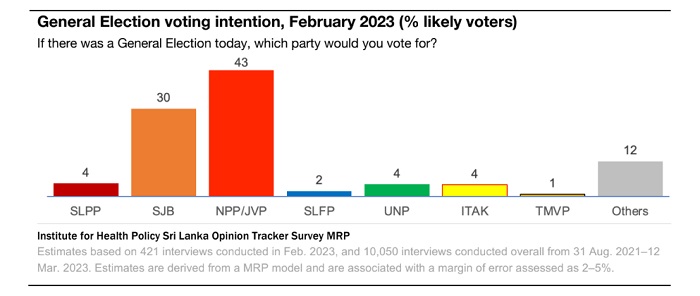
The latest Sri Lanka Opinion Tracker Survey (SLOTS) polling in February 2023 shows that nationally voters are consolidating around the National People’s Power (NPP) or Janatha Vimukthi Peramuna (JVP) and the Samagi Jana Balawegaya (SJB).
According to the latest survey by the Institute for Health Policy (IHP), nationally, voters are also consolidating around the Ilankai Tamil Arasu Kachchi (ITAK) and SJB in the Northern Province.
The survey also shows that support for the Sri Lanka Podujana Peramuna (SLPP), Sri Lanka Freedom Party (SLFP) and United National Party (UNP) is falling.
Overall, NPP/JVP support surged in February giving it a clear lead with 43% of likely General Election voters, compared with 30% for the SJB.
The SLPP, UNP and ITAK were far behind with support of 4% of likely voters each, and SLFP support remained at 2%.
The NPP/JVP lead in February would have been larger if not for a gap in voter enthusiasm with its supporters saying they are less likely to vote. We estimate this reduces its lead over the SJB from 15 points amongst all adults (44% vs. 29%) to 13% amongst likely voters.
The surge in favour of the NPP/JVP follows three months in which it ran neck-and-neck with the SJB. In contrast, there was no increase in support for the SJB in February. IHP’s latest MRP analysis of likely voters indicates that in the 12 months since February 2022 when SLPP support last peaked, the NPP/JVP has gained 30 points and the SJB 11 points.
Meanwhile, the SLPP and SLFP have lost 28 and 15 points respectively, and the UNP has seen its support fluctuate but end only two points higher. During these twelve months, support for the NPP/JVP has fluctuated, peaking in April and in
July 2022, and then again currently, but over the long term its support has steadily risen. In contrast, the increase in support for the SJB has been slower but also less volatile.
The fluctuations in support for the NPP/JVP indicate that it has benefited successively from successive swings in floating voters. During February–April 2022, it gained support from the SLPP and SLFP; then during May–July 2022 it benefited from more voters abandoning the SLPP; and most recently from October 2022, it has gained from declines in support for the SLPP and the UNP.
In the Northern Province, ITAK has gradually gained support, with the SJB and JVP also making gains. The NPP/JVP and SJB share the lead in the other provinces.
Overall trends in the past three months suggest that the electorate is moving on from the immediate aftermath of the collapse of the Gotabaya Rajapaksa Presidency when voter preferences remained fluid and voters divided across five national parties.
The NPP/JVP and SJB appear now to have emerged as the primary choices of most voters, with they and ITAK receiving the support of almost eight in ten voters. The other three leading national parties—the SLPP, SLFP and UNP—are still likely to win some seats in a general election, but all three would fail to win seats in many districts.
During the last four months, the NPP/JVP has led in the Western, Southern, North-Central and North-Western provinces, whilst the SJB has led in Central, Eastern, Uva and Sabaragamuwa provinces.
Dr Rannan-Eliya, SLOTS lead investigator and IHP Executive Director, pointed out that on these trends, the SLPP, SLFP and UNP would fail to win seats in many districts if a General Election was held today, as they would win insufficient votes to meet the thresholds.
He added that the latest polling indicates that the electorate appears to be moving on from the confusion that followed the collapse of President Gotabaya Rajapaksa’s administration, when voters switched repeatedly between parties, with no set of parties dominating.
Full report: http://ihp.lk/publications/docs/SLOTSReport202306.pdf. (NewsWire)


